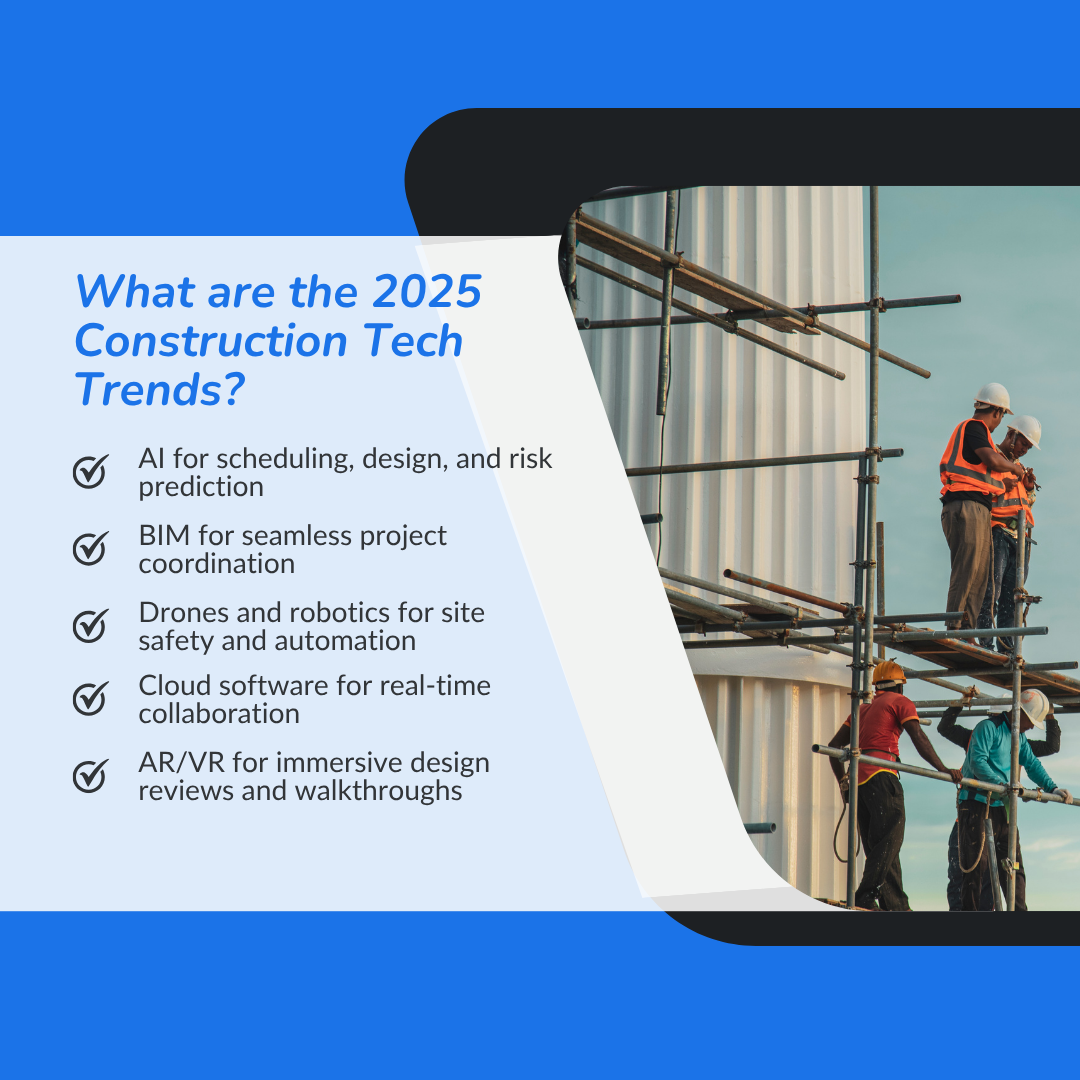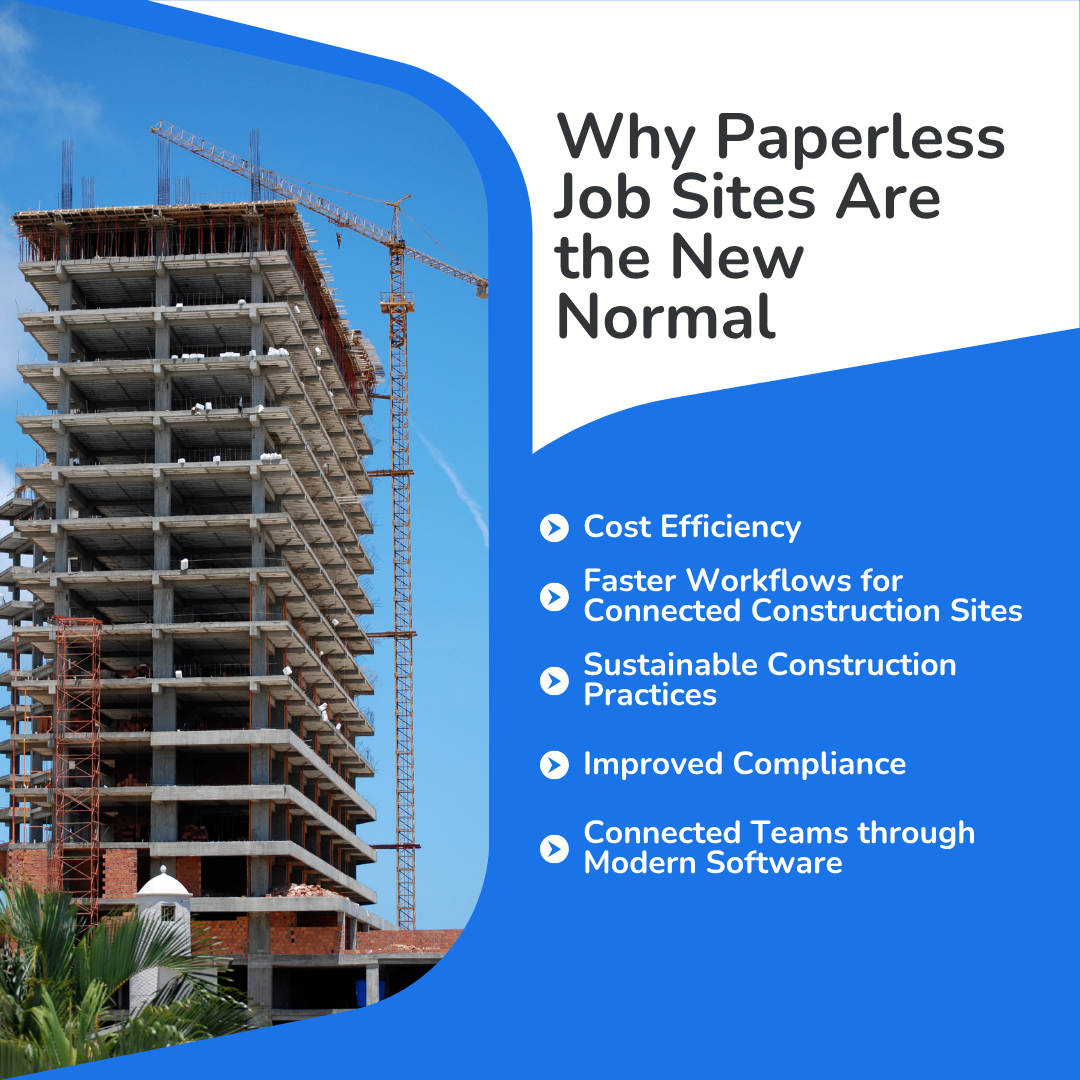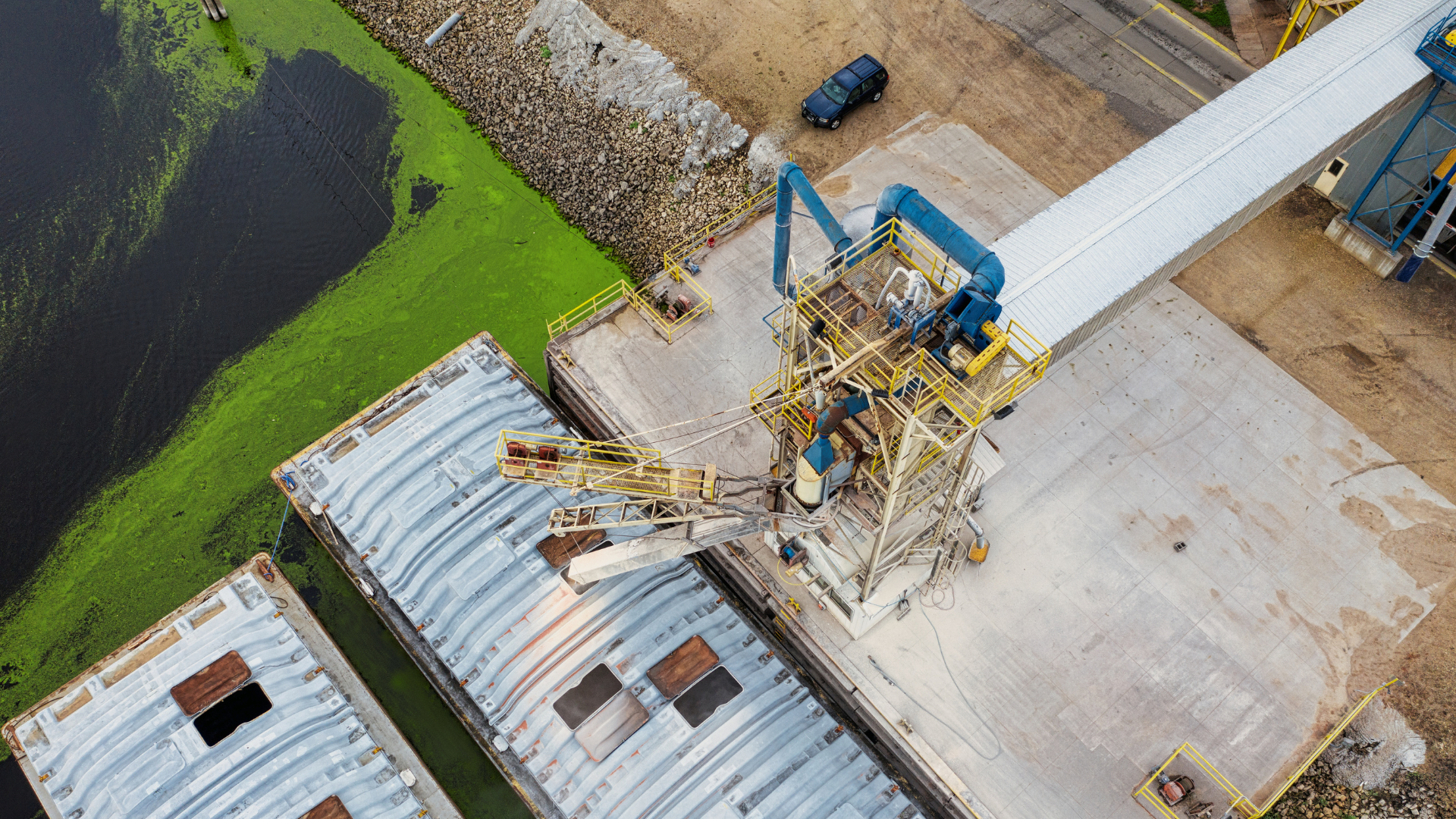Audio overview: Listen & Learn
The construction industry is evolving rapidly. What once relied on blueprints, manual logs, and on-site guesswork now runs on real-time data, cloud platforms, and smart automation.
Digital tools aren’t just for tech giants anymore; they’re enabling companies of all sizes to work faster, reduce waste, and manage projects with more precision.
So, whether you're dealing with rising material costs, labor shortages, or tighter deadlines, digital transformation has become a must, not a maybe. From smarter scheduling to paperless workflows, it’s reshaping how we build from the ground up.
Let’s explore how 2025 is becoming the most connected and efficient year for construction.
Why Digital Tools Are Transforming Construction in 2025
In 2025, construction is no longer just about bricks, beams, and manpower. It's about smart systems, connected workflows, and data-driven decisions.
Digital tools are transforming every step of the process from planning and design to on-site execution and post-project analysis.
So, what once required endless paperwork and guesswork now happens in real time, with greater precision and far less friction.
Therefore, no matter whether you're leading a small team or managing complex infrastructure, these tools help you save time, reduce errors, and build with confidence.
The future of construction is here, and it's digital.
Key Takeaways
- Digital tools are no longer optional; construction firms using them see up to 20% cost savings and 43% fewer safety incidents.
- AI, BIM, and real-time data are redefining construction industry trends, making projects faster, smarter, and more sustainable.
- Paperless workflows and connected construction sites are becoming the standard for efficient project delivery and resource management.
- To stay competitive, construction companies must embrace technology that reduces delays, mitigates risk, and improves client satisfaction.
An Overview of the Construction Landscape in 2025
The Market Value and Slow Growth of the US Construction Industry
The U.S. construction industry is poised to reach $2.12 trillion by the end of 2025, as per Next Move Strategy Consulting, driven by investments in infrastructure, data centers, and sustainable building projects.
Despite growth, the sector is facing slowing real output (projected at just 1.4% for 2025 according to Business Wire) due to weak investor confidence, supply chain disruptions, and persistent labor shortages.
Digital Tools Driving Construction Industry Trends
As construction firms tackle more complex projects with tighter budgets and timelines, the shift toward digital technologies is accelerating.
Trends like Building Information Modeling (BIM), modular construction, robotics, and AI-powered project management are reshaping everything from resource allocation and job site safety to real-time data tracking and supply chain efficiency.
To remain competitive, construction companies must go beyond traditional methods and embrace modern tools that optimize workflows, reduce project delays, and support sustainable construction practices.
Therefore, in 2025, innovation isn't a luxury; it's the foundation for success in a rapidly evolving construction landscape.
What Are the 2025 Construction Tech Trends?

From Blueprints to Algorithms
The construction industry in 2025 doesn’t only build, it predicts, plans, and performs with precision. Gone are the days when project managers relied solely on instincts and paperwork.
Today, leading construction firms are reshaping construction processes through intelligent, connected, and sustainable technologies.
Here’s how smart software tools are reshaping modern construction sites and project delivery:
- AI & Machine Learning: Smarter project planning, risk forecasting, and better resource allocation for complex builds.
- BIM (Building Information Modeling): Real-time coordination between teams and transparent project data oversight.
- Drones & Robotics: Boosting worker safety, automating inspections, and cutting labor costs.
- AR/VR Tools: Virtual walkthroughs that refine designs before the ground is even broken.
- Cloud-Based Platforms: Keeping all stakeholders synced with real-time data across connected construction sites.
- Sustainable Construction: From recycled materials to modular construction, the shift to green building is real and growing.
In short, construction technology trends in 2025 are less about gadgets and more about outcomes, focusing on delivering faster, safer, and smarter construction projects while navigating skilled labor shortages, rising costs, and sustainability goals.
If you're still doubtful about technology trends, see How to Embrace Technology: A Guide for Skeptical Contractors.
The Rise of Digital Adoption by Construction Firms
Digital Spending Is Skyrocketing
More and more construction firms are now dedicating their tech budgets to digital tools – and the payoff is real:
- 62% increase in administrative efficiency through cloud management technology, according to Neo Intelligence.
- Additional millions in incremental revenue per firm
So why are construction companies shifting away from traditional methods?
- Labor shortages are forcing smarter resource allocation
- Today's clients expect tech-enabled project management
- Regulatory compliance is stricter than ever
- Green building standards and sustainable construction practices are in demand.
In fact, according to Deloitte, the average construction firm now uses 6.2 digital technologies, up from 5.3 the prior year.
What used to be optional features, such as mobile access to data, cloud-based workflows, AI-powered scheduling, and BIM coordination, are now essential for minimizing project delays and optimizing construction project delivery across the industry.
Make your firm future-ready as digital adoption isn’t just an upgrade; it’s the new foundation.
Are you facing delays while delivering construction projects? Explore 5 Strategies to Prevent Construction Project Delays.
Software Tools and Advanced Building Materials Defining Construction Tech in 2025
Construction firms are increasingly moving from traditional methods to connected, intelligent platforms. Here’s how three key tool categories are reshaping the industry:
1. Construction CRM: ConstructionBase
- Built for contractors adopting digital tech for the first time, ConstructionBase integrates estimating, scheduling, CRM, budgeting, and mobile field reporting into one platform.
- It enables automatic material takeoffs, real‑time task tracking, and dashboards for monitoring progress, even for less experienced tech users.
2. Design & Visualization Tools
- AutoCAD & Revit (BIM) deliver machine-learning-assisted modeling, clash detection, and coordinated design workflows.
- Navisworks supports clash detection and integrated review across models.
- Unity Reflect & Microsoft HoloLens bring immersive AR/VR site walkthroughs and collaboration pre‑construction.
3. Pre-construction and Estimating Software
- STACK: This cloud-based software lets you perform quantity takeoffs directly from digital plans. It’s built for real-time collaboration, helping you create detailed, professional proposals in a fraction of the time. It's not a complete CRM but complements CRM workflow.
- Trimble AccuBid: A go-to for MEP (mechanical, electrical, and plumbing) contractors, AccuBid automates complex pricing and calculations. Like STACK, it focuses on estimating and bidding rather than full CRM features. It can integrate with CRM or project management platforms, but isn’t a standalone CRM solution.
Why Paperless Job Sites Are the New Normal

Believe it or not, in 2025, paperless construction sites are the industry standard. With rising project complexity and mounting pressure for sustainable construction practices, digital workflows are helping construction companies streamline project workflows, reduce cost overruns, and accelerate delivery.
1. Cost Efficiency
Eliminating printing, couriering, and physical storage saves thousands across construction projects. Digital records reduce costly rework caused by missing documents or outdated plans.
2. Faster Workflows for Connected Construction Sites
Real-time approvals, instant site inspections, and always-updated forms speed up construction processes. Moreover, project managers and field teams can access live project data on mobile devices, boosting productivity across job sites.
3. Sustainable Construction Practices
Going paperless supports green building and LEED tracking. With fewer physical resources and lower emissions, construction firms improve both their environmental footprint and their brand image in a tech-forward construction market.
4. Improved Compliance
Digital logs simplify audit trails and compliance documentation. Regulatory reporting becomes seamless, especially for complex construction projects where traceability is the key.
5. Connected Teams for Construction Managers
Cloud platforms unify the field and office. From design updates to safety monitoring, everyone from estimators to construction workers stays aligned.
In a sector facing labor shortages, supply chain disruptions, and a need for smarter project delivery, paperless job sites are unlocking real-time data visibility, optimizing resource allocation, and empowering construction professionals with intelligent, efficient project management tools.
It’s not just modern, it’s necessary.
What Emerging Technologies Are Changing the Game in Construction?

The construction industry in 2025 looks very different from what it was just a few years ago. The rise of digital technologies is transforming construction sites into smart, connected environments where data drives decisions, safety incidents decline, and projects finish faster and more cost-effectively.
As construction firms race to stay competitive, here’s how today’s most impactful construction tech trends are reshaping the landscape:
1. AI, Machine Learning & Real-Time Data
Artificial intelligence (AI) is no longer a future concept; it’s already here, enabling construction companies to:
- Predict project delays before they happen
- Optimize resource allocation across job sites
- Manage risk in complex construction projects
- Improve worker safety through proactive safety monitoring
Machine learning tools analyze project data to fine-tune planning and avoid cost overruns. This is making efficient project management not just easier but smarter.
2. Modular Construction & Advanced Building Materials
Modern construction methods like modular construction are gaining momentum. They offer:
- Faster project delivery with lower labor costs
- Use of sustainable and recycled materials
- Greater control over quality and precision
This shift is helping construction managers move away from traditional construction methods and embrace more sustainable construction practices without sacrificing performance.
3. Business Information Modelling (BIM), Digital Twins & Cloud-Based Collaboration
With tools like Building Information Modeling (BIM) and ConstructionBase:
- Construction teams share project data in real time
- Remote site inspections and digital project oversight become seamless
- Project workflows are streamlined, improving project delivery
These platforms are becoming essential to managing the increasing complexity of infrastructure projects and keeping all stakeholders aligned.
4. AR/VR, Robotics & Automation
Robotics and automation are changing how construction machinery operates. Meanwhile, augmented and virtual reality (AR/VR) tools let professionals:
- Conduct site inspections remotely
- Train construction workers to work more safely
- Visualize building structures
With tighter regulations, labor shortages, and rising client expectations, construction companies have no choice but to embrace these construction technology trends. From smarter project planning to connected construction sites, the industry is evolving fast.
The question now isn’t if you should go digital, but how fast you can adapt to the future of construction.
Overcoming Resistance and Challenges in Digital Construction Management
Despite the rapid rise of construction technology trends, many construction companies still hesitate to adopt new tools. Why? It often boils down to three key concerns:
- The perceived high cost of new construction equipment or platforms
- A skills gap among workers unfamiliar with digital tools
- And the comfort of sticking to traditional construction methods that have “always worked”
But here's the truth: the construction industry is evolving faster than ever. From artificial intelligence to real-time data and modular construction, today’s construction tech trends are practical.
Moreover, firms using digital tools have seen project costs drop by up to 20% and safety incidents fall by 43%.
How to Adopt Digital Construction Equipment
For skeptical construction firms, the smartest path is to start small. Test one area of your operations, say, project planning, RFIs, or safety monitoring, and implement a user-friendly tool with strong onboarding support. Platforms like ConstructionBase offer exactly that.
Next, track the results. You’ll likely see gains in worker safety, reduced project delays, better resource allocation, and more efficient project management.
By leveraging technology to streamline project workflows and enhance delivery, even minor adjustments can yield significant, measurable ROI.
The key is not to overhaul everything at once but to take the first step toward a smarter, more sustainable construction future.
Driving Sustainability & Compliance with Tech

Modern construction technology supports both sustainable construction practices and regulatory compliance. Here's how:
- Green Tools: Help monitor carbon emissions, reduce construction waste, and enable eco-friendly design decisions
- Software Integration: Automates audit trails and safety documentation to ensure compliance with regulations
- Digital Planning: Minimizes material overuse, reduces project delays, and cuts down on costly change orders
These digital solutions help construction firms be innovative, greener, and more accountable.
Do you often face a cash crunch? Here's how Managing Cash Flow in Construction Projects can solve your problems.
When to Adopt Digital Tools in Construction?
You should begin the digital transformation now, especially if you are:
- Launching a new construction project in 2025: Stay aligned with construction tech trends like AI, BIM, and augmented reality
- Applying for LEED by the US Green Building Council or green certifications: Embrace advanced building materials and sustainable construction practices
- Struggling with project delays or cost overruns: Connected construction sites and real-time insights improve efficiency.
- Aiming to enhance client satisfaction: Modern construction management tools help construction managers streamline delivery and ensure smoother project oversight.
What Does This Mean for Construction Leaders?
Still on the fence about adopting digital tools? Ask yourself:
- Are manual tasks eating into your time?
- Are you spending too much on rework?
- Are teams relying on outdated information?
If the answer to any of these is “yes,” it’s a clear sign. Modern construction technology doesn’t require a massive overhaul on day one.
Start with one tool, one process, and build from there. Every small shift, whether in project management, equipment use, or data tracking, adds up to your firm's growth.
In today’s construction industry, slow digital adoption often means falling behind.
ConstructionBase: Simplifying Digital Adoption for Everyday Builders
ConstructionBase is designed to support construction firms in the shift toward smarter, more efficient construction technology trends. Unlike enterprise tools built for large projects, Constructionbase enables work across construction sites, complex construction projects, and smaller commercial jobs.
Built as an all-in-one platform, it covers:
- Estimation and automated takeoffs: Generate resource-efficient material lists with real-time pricing, improving accuracy and speeding up bid preparation.
- Scheduling and project planning: Drag-and-drop Gantt charts manage timelines, crews, and equipment for better project delivery.
- Budgeting and cost management: Monitor job spending in real time to prevent cost overruns and optimize resource allocation.
- Task tracking and mobile field reporting: Enables construction managers and workers to sync updates instantly across connected construction sites.
Designed with a non-technical user in mind, ConstructionBase bridges traditional methods with modern construction processes.
It empowers project managers, construction professionals, and construction companies to improve efficiency and collaboration without overwhelming complexity.
This platform exemplifies how construction technology trends from real-time data to unified workflows can be practical, intuitive, and accessible to firms working on modern construction, green building, and sustainable practices.
Wrapping Up
In 2025, digital tools are no longer an edge; they're the engine powering construction’s transformation.
From AI-driven insights to paperless job sites, modern construction technology enables faster, smarter, and safer project delivery.
As construction industry trends accelerate, the firms leading the way are those embracing innovation now.
Whether you're building skyscrapers or single-family homes, adopting digital workflows means fewer delays, better resource allocation, and greater resilience.
The future of construction is connected, data-driven, and already unfolding. Are you ready to build smarter with ConstructionBase?
About ConstructionBase
Designed for everyday builders and non-technical users, ConstructionBase is an all-in-one platform that simplifies the shift to digital construction technology.
It integrates estimating, scheduling, budgeting, and mobile reporting to streamline project workflows and improve efficiency without overwhelming complexity.
Schedule your free demo today and start building smarter.
FAQs
Q1: What are the construction technology trends?
Construction technology trends in 2025 include artificial intelligence, building information modeling (BIM), modular construction, real-time data sharing, and connected construction sites. These innovations help streamline construction processes, reduce delays, cut costs, and promote sustainable building practices.
Q2: What is the next big thing in construction?
The next big thing in construction is the integration of robotics and automation with digital twins and AI. These technologies enhance project planning, safety monitoring, and resource allocation—revolutionizing how complex construction projects are executed across the construction industry.
Q3: What are the new technologies for construction management?
New technologies transforming construction management include cloud-based platforms, AI-powered scheduling, BIM, augmented reality for site inspections, and mobile project tracking tools. These tools enable efficient project delivery, improve collaboration, and reduce cost overruns in modern construction projects.
Have questions or need personalized advice?
Talk to an Expert Today and let our construction specialists guide you to success.







